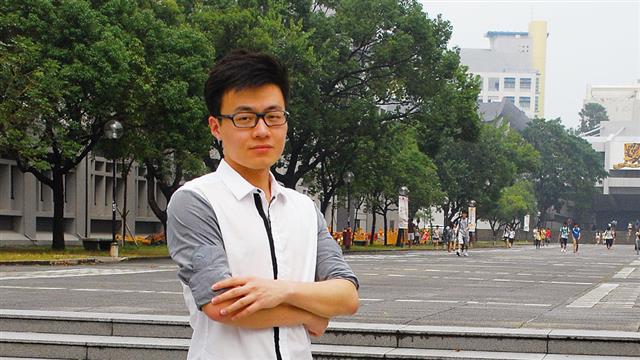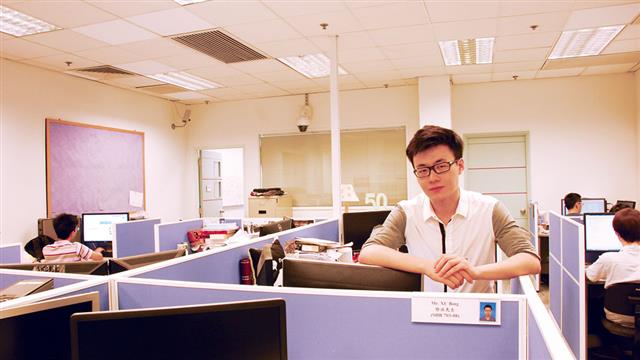Please tell us about your background. Why did you choose to study at CUHK?
I came from Weifang, Shandong Province, where I had studied for all the years before coming here. My parents wanted me to receive a diverse education in a global city like Hong Kong. I didn't know much about CUHK but I was attracted to Hong Kong. I was admitted to the Mathematics and Information Engineering Double Degree Programme in 2008.
Why did you choose to pursue doctoral studies here?
I was a research assistant of Prof. Lam Wai of the Department of Systems Engineering and Engineering Management in Year 3 and worked with PhD students on the studies of artificial intelligence and machine learning. I was fascinated by the topic and devoted all my energies to it. It's also the theme of my final year project. My research ability was recognized by my teachers. Since I am interested in research and not yet prepared to work, I decided to stay for the PhD Programme in Information Engineering.
What do you think of Hong Kong's research environment?
I find that the salary, research ethics, funding, and facilities are decent. There is not much interference from outside which allows me to focus on research. But if you plan on taking the research path after graduation, there aren't many jobs available whether academic or non-academic. In other words, Master or doctorate graduates do not seem to have an edge over undergraduates. This is not beneficial to the sustainable development of Hong Kong's scientific research.
What's the greatest benefit you got from studying in CUHK?
The University's free, open and diverse environment offers many opportunities for creating knowledge. As the president of CUPSA, my vision and social network are widened, and my competence enhanced. The work of a student association is similar to that of an enterprise. We have total autonomy, but we also have to grapple with problems ourselves. You can't imagine what you learn through the process.
How is your university life? Any unforgettable experiences?
My university life is rather simple, focusing on exploring different modes of learning and research. A relatively unforgettable experience took place in Year 3—I decided to challenge myself by taking eight courses with a total of 21 credits and working as a research assistant. It pushed my time management skills to the limit. Tough but most rewarding and fulfilling.
Please tell us about the CUPSA. How many members are there? What are the activities being organized?
Established in 1997, the CUPSA strives to promote the welfare of some 13,000 postgraduate students, and facilitate communication with the University. We have over 5,400 members and the number is increasing as we speak. Students register for CUPSA on a voluntary basis either online or by visiting our office. Our activities are divided into four categories: i. recreation and sports; ii. career services such as career talks, company visits, mock interviews; iii. orientation and graduation activities; iv. exchange activities. We established the Asia-Pacific Alliance of Postgraduate Student Associations recently and organized a five-day inauguration ceremony and the first annual forum which invited representatives from postgraduate student unions from universities in Hong Kong, Macau, mainland China, Taiwan, Malaysia and Singapore to attend. CUPSA organizes over a hundred activities annually and there are activities every week.
Postgraduate students all have different class-times and research schedules. How do you organize and mobilize them?
We rely on some 300 officers to promote and encourage their classmates and friends to join the association. We utilize platforms including e-mail, Facebook, Weibo to communicate with members. These tools are very effective. Shortly after an announcement of an activity is released, we receive hundreds of enrolment requests.
What is the major difficulty in organizing activities?
Funding. Most of our funding comes from membership fees. On top of that, we receive subsidy from the University and a bit of sponsorship. The CUPSA has 26 clubs, a growing membership, and organizes a large number of activities. Therefore we have to do our very best to save costs.
What would you like to do for your members?
CUPSA is still in its infancy and there is huge potential for development. Taking up the presidency is challenging and I like to serve the postgraduate student community. In fact, the CUPSA has grown considerably over the past year in terms of the number and composition of members, the number and scale of activities, members' welfare, communication and exchange both inside and outside campus.
Any plans for the future?
I'll step down from the presidency in December but I'll take time to advise the succeeding cabinet on CUPSA's development. After graduating in 2016, I plan to work or start a business venture in Hong Kong. Having gone through the presidency of the CUPSA, I am well-prepared to enter society and a new stage of life.




